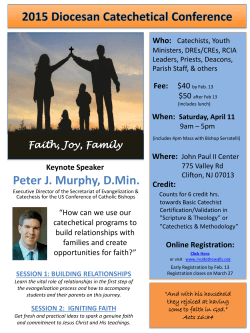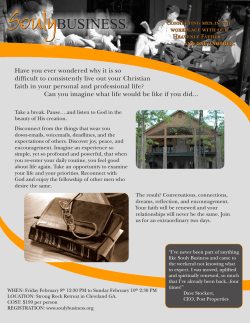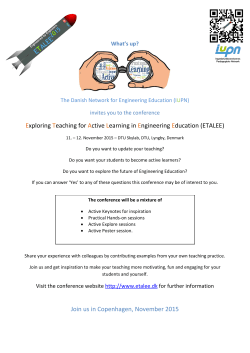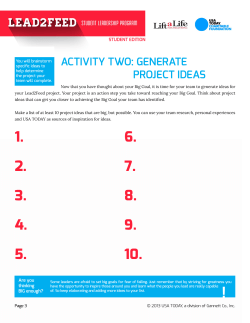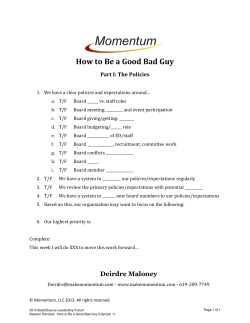
Leaders Lead, Laggards Lag
Leaders Lead, Laggards Lag The reason a "result" is not a useful leadership tool is that it is "following" the action and based on the emotions. The reason focus is on “lagging” indicators is akin to a bad joke in which a guy asks a fellow on his hands and knees looking for something about why he was doing it. The fellow responded and the guy quickly again asks naively, “where did you drop it” and the fellow answers “over there!”. The guy now confidently asks (since he thinks he’s solved the problem), “why on earth are you looking here then?” Whence the fellow of clearly equivalent intellect scornfully answers, “because the light is better over here.” The streetlight effect is a type of observational bias where people only look for whatever they are searching by looking where it is easiest. The lagging indicators are easy to find and see and yet there is more wrong than just misplaced focus. What is the “heart” of the problem then? A good result sends the heart soaring and a bad one breaks the heart and both affect effort levels with no practical means nor thought of balancing with focus. “A result is a motivation and never should be a focus yet often it is.” Claiming this misrepresentation is not "hocus pocus", and yet real science that can be proved easily time after time and in many different systems and scenarios. Results are in the realm of motivation, and the heart of emotions and specifically effort. Properly balanced with a focus on the process at hand, effort is a key performance control that leaders use - a precursor of consequence. An improperly focused effort to affect results by noting and applauding good results or scolding bad ones is a completely avoidable imbalance yet a widely accepted and prevalently repeated one. Focus, likewise, is inherently flawed as a performance indicator or tool to lead since it is a function of the mind whereas intense focus is needed at times and it requires effort from the heart of emotion. Simply noting focus of the carpenter on the head of the nail is silly unless the balance with which the effort to "hold" the focus and draw back the hammer and strike is considered of primary importance. Balanced focus and effort is the key to confidence. Confidence inspires spirit that emanates knowledge of the fact that balancing focus on impact with the effort to deliver the "blow" is key and works to ensure the nail is driven in straight and quickly with no bent nails nor smashed thumbs. Focus on the point of the nail going into the wood rather than the head of the nail the hammer strikes, is the cause of “bent” nails and “smashed” thumbs. Proving this is no major task and the exact opposite of magic that utilizes distraction from concealed efforts as opposed to focused efforts. There are many physical examples of this in the world we live in high performance and malfunction due to misplaced focus. • • • • • Focus with no effort is unmotivated. Effort with no focus is undisciplined. Undisciplined effort does not learn. Unmotivated focus does not aspire. Energy flows where focus goes How can undisciplined effort learn since it is unaware of the cause of failure? “Since its focus is on the result and NOT the cause, undisciplined efforts fail twice because they do not learn from mistakes.” Note a recent headline: One reason that some people seem unable to learn from their mistakes has been pinpointed by scientists. A spelling mistake in the DNA of a gene within the brain seems to impair the ability of a person to improve their performance based on knowledge of earlier errors. The findings may also help explain why this same variant has previously been linked to addictive and compulsive behaviors, according to the German team that reports the discovery today. When people inherit this variation of the gene, called A1, they make fewer docking points in the brain for a chemical called dopamine, one that carries messages between brain cells and plays a key role in movement, balance and in reward and pleasure circuits. The discovery, reported in the journal Science, was made by Tilmann Klein, Dr Markus Ullsperger and colleagues of the Max Planck Institute for Human Cognitive and Brain Sciences in Leipzig, Germany and Max-Planck-Institute for Neurological Research, Cologne, with colleagues at the universities of Bonn and Giessen. This is absolute nonsense and simply excusing misplaced focus ??????????????????????????????????????????????????????? ??????????????????????????????????????????????????????? “spelling mistake in the DNA of a gene within the brain” ??????????????????????????????????????????????????????? ??????????????????????????????????????????????????????? 1. 2. 3. 4. “reward and pleasure circuits”, “addictive and compulsive behaviors”? Obsessed focus on results! A widely professed “MBA style” performance control. Focused efforts to affect precursors of consequence garner data our minds triangulate, and calibrate into precise trajectories on paths to successful results. Think of a cannon firing at certain trajectory say, “40 deg”. The focus is on the precursor or trajectory. The result calls for an altered trajectory - up or down. Undisciplined focus is akin to simply moving the cannon up or down without noting the precise angle (40 deg). As dumb as it seems, results based performance controls are akin to simply plotting where the projectile lands each time and proclaiming, "missed", "missed long", "missed long again", and perhaps then, "you're ranked last" and "you're fired". This is "the tail wagging the dog", at its worst. "I have not failed. I've just found 10000 ways that won't work." Thomas Edison Discipline and precise focus is defined as knowing “ways that won’t work”. “Meanwhile we muddle along ‘spotting’ and ‘reporting’ mere ‘results’ as if we are anything except promoting a magic show of befuddled employees concealing incidents, and pulling numbers out of hats if someone ‘wants’ improved results beyond their discipline to achieve it correctly” Why not? Who gets “left holding” the bag of bad results and guess who (hint: imprudent insiders aka “bad managers”) “reaps” the bag of good. Its a low incident, high consequence, inexplicably complex, industry we work in and risk takers and gamblers alike can see the odds are on their side yet against the public that must except the most easily understood coherent and plausible story – “it was the guy left holding the bag that is responsible.” This is not leadership. Everyone knows that leader. Leaders make followers feel safe because they protect them from bad results of honest mistakes that are simply paths to success if focus is on precursors of consequence. Impact is a direct result of the fact that “Energy flows to where the focus goes”. In no arena is this principle more clear than in sports where velocity of swing is maximized at the point where the eyes are focused. This is the reason that the best hitters in baseball try to see the ball hit the bat. Even though some claim it is impossible, Ted Williams, the greatest hitter of all time, claimed he could see the baseball hit his bat. The analogy to this “impact focus” and the focus needed on the task at hand rather than the “results” is clear. Ted Williams would not have been the greatest hitter of all times if his focus had been on the place the ball would travel to (the target and result desired), while hitting. In fact the ball would have most likely never reached the target he was looking to hit, since he would have swung and missed the ball entirely, due to misplaced focus and “swinging blind”. They fact that the swing velocity is maximized if the ball is seen hitting the bat is the proof that, “Energy flows to where the focus goes”, and is the universally held belief by hitting coaches around the world. This principle works for engineers focusing efforts on the tasks and not the targets/results. Let’s distinguish always between targets/results and points of impact in our operations. Keeping people inspired to desire worthy goals, while effort fully focused on tasks before them within competent processes, is the key performance control leaders refer to as CONFIDENCE. Confidence is a spirit and can also be an inspiration and yet is also can be detected, measured and communicated in relatively measurable terms. Ask someone if they are confident and we quickly get indicators from their body language that might belie their desire to answer favorably. This is because everyone knows that confidence is the key to good performance. We can see someone answer “yes” while shaking their head, “no”. We can ask them, “okay, tell me on a scale of 1-10 the level of your confidence?” and get a more honest answer. Confidence helps us survive periods of less than stellar results and this is because confidence is a spirit that motivates effort. A spirit will survive heartbreaking setbacks and is easily reconnected with in order to re-motivate them. We’ve all seen the inspirational speeches of coaches after a setback. Without the inspiration of confidence, there is no inspirational speech after the setback and there is no “miraculous” comeback from a newly inspired and motivated team. These coaches are “leaders”. They are “leading” efforts and “leading” focus. They are basing the need to lead on confidence levels clearly assessable. They can clearly see their team has either lost their focus or is demotivated by RESULTS. The coach will INSPIRE them to “forget about the score, let’s remember WHY we are here in the first place!”. The coach will then direct the team to focus their renewed inspired and motivated efforts by saying, “now let’s go out there and play like we know how!”. The team then roars back onto the playing field. This is leadership. This is not charisma. This is not talent. This is using the precursors of consequence to re-focus the efforts of a team on the task at hand. Now that we see the benefit of inspiration over motivation lets understand why inspirations that maintain confidence also really on carefully positioning a disciplined focus on precursors of consequence in the tasks that lead to results. By definition confidence cannot exist if the result is certain. con·fi·dence ˈkänfəәdəәns/ noun: confidence 1 the feeling or belief that one can rely on someone or something; firm trust."we had every confidence in the staff" 2 synonyms: 3 trust, belief, faith, credence, conviction "I have little confidence in these figures" The word origin of “confidence” is built on the Latin Fides Latin Etymology 1 From Proto-Indo-European *bʰidʰ-, zero-grade of Proto-IndoEuropean *bʰeydʰ- (“to command, to persuade, to trust”). Cognate to Latin fīdō (“I trust”) Noun[edit] fidēs f (genitive fideī); fifth declension 4 faith, belief 5 reliance confidence, trust The common understanding of faith or trust is not that the result is certain and yet that if we focus efforts on doing right things the results will be favorable in the end. The team that is faced with unfavorable results has a crisis in trust and faith and thus loses its focus and then perhaps is broken down and it is affecting their effort. They are in a sense “demoralized” because they had faith that if they gave 100% focused efforts, in the end, the result would reward them. The problem is, the game isn’t over and yet their efforts have stopped because their focus has shifted to obsession over the shortterm results instead of having faith to persist and persevere through effort and focus to the end. If the team had been focused on their ways and actions then they would have been learning and able to make minor adjustments that might impact the game. It just so happens that trust is not only about focus and efforts of an individual and yet there are biological and psychological implications on teamwork. One animal study recently looked at the effects of the brain chemical oxytocin on trust formation in voles. The researchers compared monogamous prairie and pine voles, and polygamous mountain and meadow voles, which mated more promiscuously. They found that the monogamous voles had higher-density oxytocin receptors in many areas of the brain than did the polygamous voles. This meant more-trusting partnerships occurred between the animals whose brains had better oxytocin uptake. Researchers later found that when human beings were given oxytocin nasal spray, they, too, were more likely to trust their partners. The link to confidence and trust is now shown to: 1. Assess a balance of efforts and position of task focus. 2. 3. 4. 5. 6. Focus our efforts on the tasks at hand. Maximize and stabilize our effort motivated by inspiration. Ensure and Increase trust and teamwork. Maximize the impact of our actions. Be the precursors of consequence by leading. It is hoped that this article leads others to see that the leadership “precursors of consequence” of high performance are to monitor and maintain confidence built on a balance of effort and focus on the tasks at hand. It is also hoped that while there is a time and place to “look at” results, they are a motivation and yet should align with inspiration and values and never be the focus of efforts and yet simply the motivation of efforts.
© Copyright 2025
